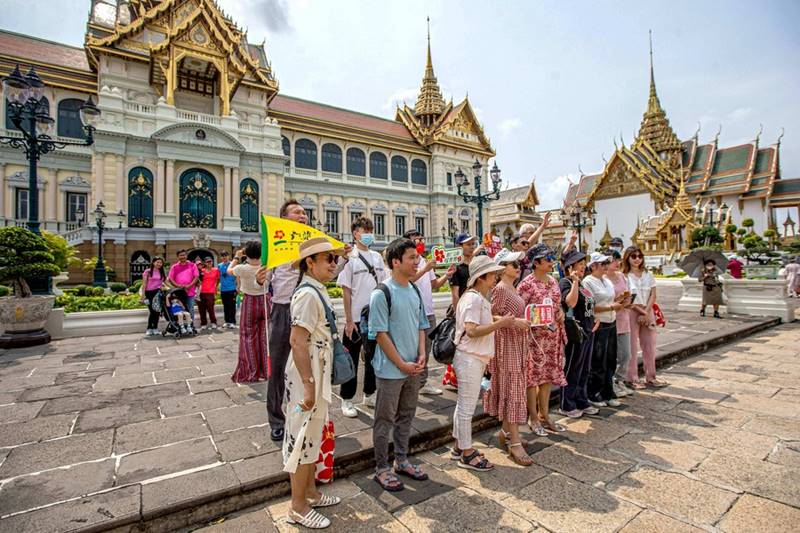Recently, Thailand introduced a new 5-year visa for remote workers and tourists who want to stay in the country long term, according to CNN.
According to a statement from the Thai Prime Minister's office, the Thailand destination visa (DTV) will allow eligible visitors a stay of up to 180 days per entry, on a multiple entry basis. times, within 5 years. That is, after the 180-day period expires, visitors must leave Thailand and be allowed to re-enter.
This type of visa is aimed at people who work remotely or come to Thailand to participate in activities such as Muay Thai training, cooking lessons, long-term medical treatment...
To apply, visitors need to prove that they have at least 500,000 baht (about 357 million VND) in their account, as well as documents proving the purpose of the trip. This type of visa costs 10,000 baht (about 7.1 million VND), does not allow the applicant to seek employment in Thailand.
Thailand needs to reduce the speed at which tourists leave the country
The Thai government has also expanded the list of countries and territories exempt from visas for short-term tourism and business purposes from 57 to 93 countries, and extended the stay period from 30 to 60 days. . Meanwhile, the number of countries/territories whose citizens are granted entry visas has also increased from 19 to 31.
According to government data, Thailand welcomed 17.5 million foreign tourists in the first half of this year, up 35% over the same period last year. But experts say the new visa measure is not just aimed at attracting more tourists.

“If you look at what Thailand has done, the initiatives and campaigns it has This has been implemented over the past two years to attract tourists and has been very successful.
Therefore, Thailand leads Southeast Asia and far surpasses the rest of the countries in terms of the number of tourists visiting. But the big problem is that despite the large number of visitors, the average spending per visitor is relatively low."
Bowerman added that the pressure on resources is also growing stronger. “The added value from more and more people coming is not easy to feel,” he said. Therefore, they need to find ways to really increase the length of stay and increase the spending level of each visitor."
At the same time, he noted that the majority of international visitors to Thailand are from the region (Asia), staying for short periods of time.
“There were a lot of people coming in, moving around, then leaving pretty quickly. That puts increasing pressure on infrastructure, airports, transportation networks... They need to slow down," he said.
That's also why Thailand is trying to attract long-stay visitors, partly to reduce pressure on immigration and traffic points.
Attracts visitors who combine work and entertainment
According to a statement from the Thai Prime Minister's Office, new measures aimed at promoting tourism and the country's economy took effect from July 15.
Thailand is certainly not the only country hoping to attract visitors to stay longer. Olivier Ponti, marketing director at travel data company ForwardKeys, said more and more people are looking for extended vacation opportunities, and many countries are taking notice.
“A global trend we have observed throughout the post-COVID-19 period is travelers staying in destinations longer. Visitor arrivals to the Asia-Pacific region are still down 23% compared to 2019, but longer stays (two weeks or more) are only down 8% compared to pre-pandemic levels,” he said.
He said many destinations have implemented new visa categories to adapt to the growing trend of remote working. Besides, flexible workplace policies also help people combine work with entertainment more easily.
“In particular, visas that allow multiple entries, have longer validity periods, and allow family members to accompany the visa holder on a trip are being successful in attracting revenue,” Ponti said. Attracting tourists to stay for a long time.
In addition, there are many other factors that affect tourists' desire to stay longer, such as quality of life, cost of living...
As for Thailand, Mr. Ponti believes that the new long-term stay visa is more likely to be accepted by long-distance travelers. They tend to stay much longer on average than visitors in the Asia-Pacific region.
"Currently, the proportion of tickets with long stays (over 14 nights) is still about 25%, average stays (6-13 nights) account for 45%," Ponti cited data based on data. flight booking data.
“These measures are likely to enhance Thailand's attractiveness to long-stay visitors, potentially increasing this proportion over time,” he said.






